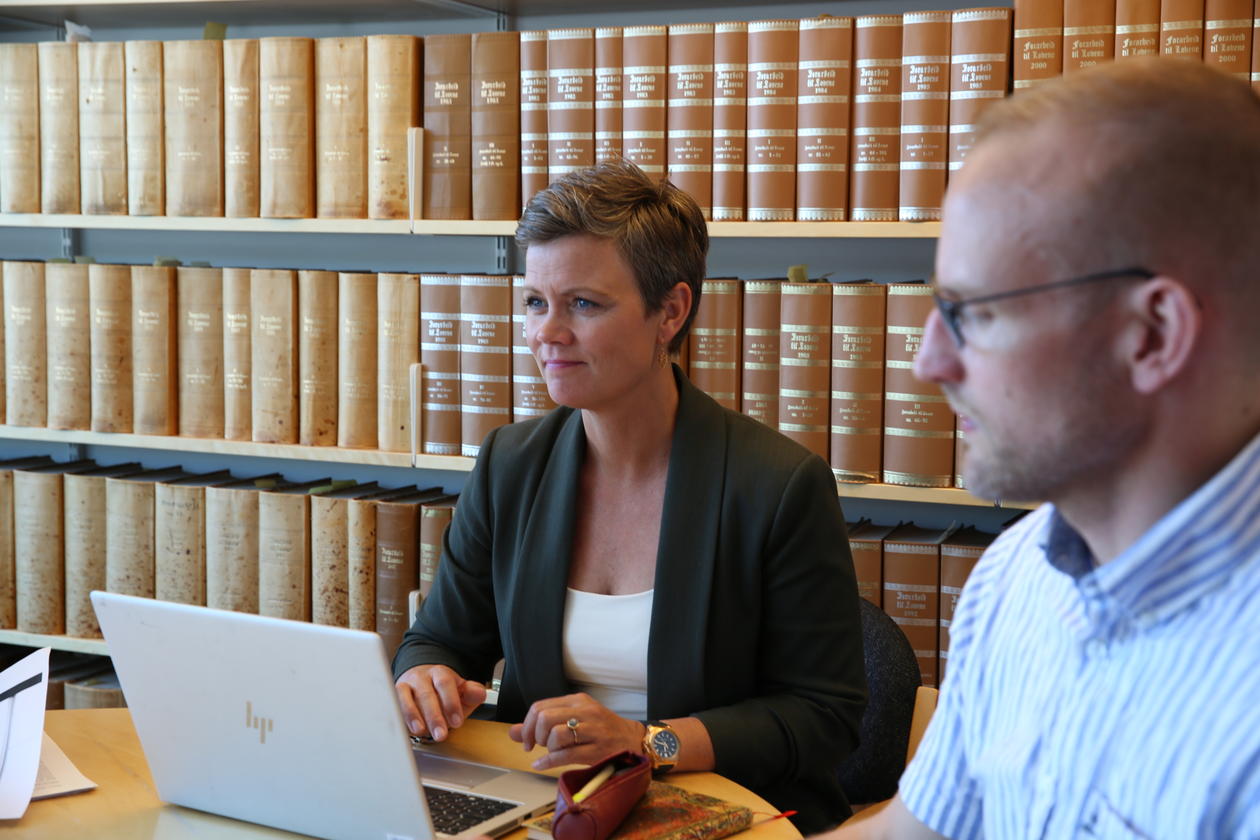The training component of the PhD programme in law
The PhD programme at the Faculty of Law consists of a mandatory training component corresponding to 30 credits. The training component consists of a compulsory part (20 credits) and an open part (10 credits).
Main content
Compulsory part
The compulsory courses will be completed together with other PhD candidates at the Faculty of Law.
| Courses | Credits | Semester |
| PHDJUR900 Introduction to legal science and writing a thesis | 3 | Autumn or spring |
| PHDJUR901 Research Design and Ethics | 3 | Autumn or spring |
| PHDJUR902 Introduction to legal theory | 3 | Autumn or spring |
| PHDJUR903 Empirical perspectives in legal science | 3 | Autumn or spring |
| PHDJUR904 Text quality | 3 | Autumn or spring |
| PHDJUR905 Dissemination of legal research | 2 | Autumn or spring |
| PHDJUR906 Role understanding and project development | 3 | Autumn or spring |
About PHDJUR906:
This course does not consist of lectures or seminars, but is a collection of the obligatory assignments:
- 1 participation at The National PhD Seminar (DNDS)
- 2 participations at the David Doublet Seminar (DD)
- 1 Project presentation
- The candidate, along with their supervisor, is responsible for finding an adequate forum and organizing the presentation.
- The project presentation shall be held within the PhD period. Recommended time is when the candidate is between 6 months and one year into their project period.
- Forum can be a research group or other national, Nordic, or international forum, as long as it has relevant academic expertise suited for the project.
- Size: The meeting must last a minimum of one hour, of which the presentation fills a minimum of 30 minutes of the time. In the case of international presentations, a shorter presentation might be approved, but only if the total time of the meeting lasts at least 30 minutes. Please contact the leader of the PhD program and the PhD coordinator for questions or clarifications regarding this.
- When the project presentation is completed, the leader of the PhD program and the PhD coordinator must be oriented in order for the presentation to be registered as completed.
Open part
As a PhD candidate you shall choose courses and attend seminars and/or conferences corresponding to 10 credits.
Relevant courses, seminars and conferences are announced on this website, via supervisors or through other channels. As a consequence of a continuously changing variety of relevant activities, the Faculty of Law have not compiled them into a list. As a PhD candidate you must therefore ensure to keep yourself updated through different forums on what is relevant in your field of research.
The Faculty of Law is a partner in the Interdisciplinary Research School on Authorative Texts ("ATTR"). The postgraduate school focuses on methodological issues related to text research and is an interdisciplinary offering for PhD candidates in law, the humanities and religion/theology. Three courses/presentation seminars are held annually, its location alternating between Oslo/Bergen/Trondheim/Tromsø/Rome/Athens/Paris.
Open part: Guidelines for awarding credits
The training component of the PhD programme consists of an open part which shall correspond to 10 credits. The PhD candidates shall themselves select relevant activities. The purpose of the guidelines is to clarify the criteria for approving activities in this open part.
The PhD programme is organised research training. In order for the activity to be approved as part of this programme, the activity must have a distinct legal scientific element. In other words, it is not sufficient that the activity concerns a legal activity. It is recommended that the candidate, in consultation with their supervisor, early on in the project plan for how they intend to carry out the elective part.
In order to count in the form of credits, the activity should have at least one of the following three elements: a) special project-related activities, b) activities related to general acquisition of legal scientific knowledge, or c) activities involving training in academic practices.
a) Special project-related activities that can provide credits may consist of:
- Project presentation with discussion at another academic institution, lasting at least one hour where the project presentation takes up at least half of that time (1 credit)
- Project presentation with discussion (the activity must total at least half an hour) in connection with participation at a one-day academic conference (1 credit)
- Participation in a one-day roundtable discussion with experts on key topics in the project (1 credit)
- Participation in a two-day academic seminar/conference on a topic relevant to the project without own presentation (1 credit)
- Language courses of a certain scope to access particularly relevant literature for the project (3 credits)
- Editorial initiative and work, for example on academic anthology on a project-relevant topic (3 credits)
- Combinations of these, for example participation in a two-day conference that also includes own presentation of project with discussion, may provide more credits depending on the scope.
b) General acquisition of legal scientific knowledge that can provide credits may consist of:
- Participation in a two-day conference on legal science and legal scientific methods (1 credit)
- Completion of courses in scientific theory or in qualitative or quantitative methodology (credits are determined based on work effort and how many ECTS the course is worth).
- One-time participation in the National PhD Seminar in Law (DNDS) is an obligatory part of the PhD programme. Additional participation provides one credit each time you participate.
c) Activities that involve training in academic practices that can provide credits, may consist of:
- Publication of article, under certain preconditions: the article must be peer reviewed, the PhD candidate must be either the author alone or the main author of the article and the supervisor(s) must have given their consent to the article project as a relevant part of the work on the PhD project.
- Particularly comprehensive dissemination project, for example participating in major media report (1 credit) or organising and conducting professional seminars with an emphasis on dissemination of legal scientific knowledge to practitioners (1 credit)
- Main responsibility for organising and conducting a major legal scientific conference (2 credits)
- Visiting a foreign academic institution for one month with participation in academic activities at the institution (2 credits)
- Holding positions such as editorial assistant at periodical or board member of academically relevant organisation for much of the project period (1-2 credits)
The credits mentioned in the examples are illustrative, and will in all cases be determined based on an assessment of the scope and content of the activity for which credits have been applied.
Credits will normally not be awarded solely for, e.g., participation at a conference without a special jurisprudential element or for short trips and stays abroad or at other institutions.
Applications for credits with necessary information about the activity shall be sent to the head of the PhD programme (Jørn Jacobsen) and PhD coordinator (Gunhild Brubakken). Approval can be given in advance if there is any doubt that an activity will provide credits according to the above guidelines.
Midway evaluation of the doctoral degree training
Objective: A midway evaluation is a seminar in which the PhD candidate presents their dissertation work for discussion. The main objective of the midway evaluation is to ensure a quality enhancement of the PhD project and that the candidate makes appropriate progress in relation to the time available in the PhD position. The discussion during the seminar is to provide a basis for an evaluation of the status of the progress of the research project. The candidate must also provide information about their progress in the training component of the PhD programme. The discussion and evaluation are to be quality assured through the allocation of the main responsibility for reviewing and evaluating the presented material to an appointed commentator with doctoral competency. The preparation for the seminar and the actual discussion is to result in a realistic schedule for the completion of the research training programme for the candidate in question.
A midway evaluation shall be held as soon as possible after the candidate has reached the halfway point of their PhD training programme. The midway evaluation cannot be replaced by another presentation of the project.
- The administrative Head of the staff section/research administration shall in consultation with the Head of the Research School prepare a plan for and overview over the PhD candidates' training programme, and at the latest three months before the candidate researches the midway point of the training programme they shall initiate the implementation of a midway evaluation. The Head of the Research School appoints the main commentator for the project. The doctoral candidate's supervisor can be given the opportunity to comment on the selection.
- At the latest four weeks prior to the midway evaluation, the candidate must submit a text material to all seminar participants.
- If the candidate is writing a dissertation in the format of a monograph, the text material shall consist of a manuscript, including a table of contents or outline, of 25 000 - 40 000 words, as well as an additional text of no more than 3 pages. This additional text should offer an overview of the project. It should also contextualize the excerpt, explain the reason why this particular text was selected as material for the evaluation, and mention what other text material that has been produced so far.
If the candidate is writing an article-based dissertation, the text material for the midway evaluation shall consist of an article that has been sent to a publisher, a draft of a second article, and a revised project description of 15-20 pages that offers a revised description of the project as a whole.
- The midway evaluation shall have a duration of about three to four hours.
- The Dean of Research, or their deputy, chairs. The Dean of Research can make an agreement with the supervisor that the latter acts as chair.
- The seminar starts with the doctoral candidate being given the opportunity to give a short overview (maximum 20 minutes) of the main questions in the dissertation, the main strategy through which these are addressed and preferably a short description of the academic or independent contributions that he or she believes the chosen approaches in the project can provide to legal scholarship.
- The main commentator is then given the floor to review the doctoral candidate's dissertation work as presented (30-45 minutes).
- Written evaluation and schedule of progress: After the end of the discussion, the supervisor, main commentator and the Dean of Research or their deputy shall immediately hold a meeting in which the status and progress of the project is discussed. The meeting is to result in an evaluation of the status of the project and some specific recommendations related to important strategic choices and the future progress of the project. Further, comments should be made regarding the doctoral candidate's completed training programme generally. For candidates that does not show required progress, there shall be made a ranged follow-up plan. The evaluation shall be sent to the research administration with a copy to the doctoral candidate, and if there is made a follow-up plan, the research administration shall be notified especially regarding this. Comments on the follow-up of these recommendations must be provided in the doctoral candidate's and the supervisor's progress report to the Faculty.

